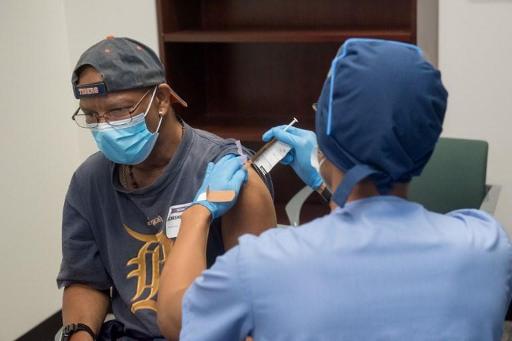The American biotechnology company Moderna announced Monday in a press release that its Covid-19 vaccine was 94.5% effective in reducing the risk of contracting the disease, similar to the 90% effectiveness announced last week by the Pfizer/BioNTech alliance.
This means that the risk of getting sick from Covid-19 was reduced by 94.5% between the placebo group and the vaccine group in the large clinical trial underway in the US, according to analysis of the very first cases: 90 participants in the placebo group caught Covid-19, compared to 5 in the vaccine group.
If this level of effectiveness could be applied to the general population, it would be one of the most effective vaccines available, comparable to the measles vaccine, which is 97% effective in two doses, according to the US Centers for Disease Control and Prevention (CDC)
Pfizer's vaccine is reported to be 90% effective and Russia's Sputnik V vaccine 92% effective, according to preliminary results released last week.
Related News
- Coronavirus vaccine will ‘not replace’ other tools, WHO warns
- 1 in 6 Belgians do not want a vaccine
- Europe expects Covid-19 vaccine to be distributed 'in January'
No serious illness from Covid-19 was recorded among those vaccinated, compared to 11 in the placebo group, according to the biotech release.
According to Moderna, about 9-10% of those vaccinated had side effects after the second dose such as fatigue, aches and pains, or redness around the injection site.
"This is a pivotal moment in the development of our Covid-19 vaccine candidate," said Moderna's CEO, Stéphane Bancel. "This positive interim analysis from our phase 3 trial gives us the first clinical indications that our vaccine can prevent Covid-19 disease, including the severe form".
These results, however, have not yet been evaluated by independent scientists. More than 30,000 participants are taking part in the large-scale, so-called phase 3 clinical trial, which began last July.
Moderna plans to apply for marketing authorisation "within the next few weeks" in the United States. If the vaccine is approved by the US Food and Drug Administration (FDA), the speed of development would be a scientific feat, less than a year after the virus emerged.
It took nine years in the 1950s to develop and approve the measles vaccine. In the last 10 years, the average development time for the 21 FDA-approved vaccines was eight years, according to a study published in the journal Jama.
In Europe, the European Medicines Agency (EMA) has set up a fast-track procedure that allows it to review safety and efficacy data on vaccines as they are released, even before a formal application for authorisation is filed by the manufacturer. Moderna on Monday became the third vaccine project to undergo this "continuous review", after those of Oxford/AstraZeneca and then Pfizer/BioNTech in early October.
Vaccinations in the European Union could begin "in the first quarter of 2021" in an "optimistic" scenario, the director of the European agency in charge of epidemics told AFP last week.
The Brussels Times

